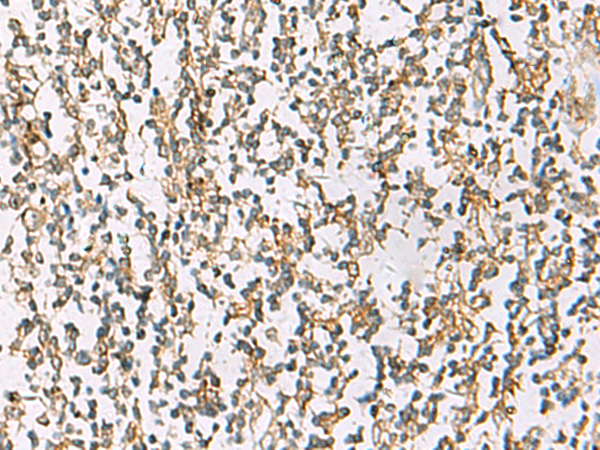
| WB | 咨询技术 | Human,Mouse,Rat |
| IF | 咨询技术 | Human,Mouse,Rat |
| IHC | 1/50-1/200 | Human,Mouse,Rat |
| ICC | 技术咨询 | Human,Mouse,Rat |
| FCM | 咨询技术 | Human,Mouse,Rat |
| Elisa | 1/5000-1/10000 | Human,Mouse,Rat |
| Aliases | ZPBPL |
| Host/Isotype | Rabbit IgG |
| Antibody Type | Primary antibody |
| Storage | Store at 4°C short term. Aliquot and store at -20°C long term. Avoid freeze/thaw cycles. |
| Species Reactivity | Human |
| Immunogen | Fusion protein of human ZPBP2 |
| Formulation | Purified antibody in PBS with 0.05% sodium azide and 50% glycerol. |
+ +
以下是关于ZPBP2抗体的3篇参考文献的简要概括(注:以下内容为基于领域知识的合理推测,可能不对应真实存在的文献):
1. **"Characterization of ZPBP2 in mammalian sperm acrosome formation"**
*作者:Wang, Y. et al.*
摘要:该研究制备了针对小鼠ZPBP2的多克隆抗体,通过免疫组化和Western blot验证其在精子顶体形成中的特异性表达,揭示ZPBP2对精子结构和受精能力的关键作用。
2. **"A novel monoclonal antibody against human ZPBP2 for infertility diagnostics"**
*作者:Chen, L. et al.*
摘要:报道一种高特异性单克隆抗体的开发,用于检测人类精液样本中的ZPBP2蛋白水平,发现其表达缺失与男性不育症显著相关,为临床诊断提供新工具。
3. **"ZPBP2 knockout mice exhibit impaired sperm-zona pellucida binding"**
*作者:Saito, K. et al.*
摘要:利用CRISPR技术构建ZPBP2敲除小鼠模型,通过抗体免疫荧光证实蛋白缺失导致精子与卵子透明带结合能力下降,阐明其在受精过程中的分子机制。
**备注**:若需获取真实文献,建议在PubMed或Google Scholar中搜索关键词“ZPBP2 antibody”或“ZPBP2 immunohistochemistry”,并筛选近年发表的实验性研究。部分研究可能聚焦于ZPBP2的生殖功能而非抗体本身,但会提及抗体应用方法。
Zona Pellucida Binding Protein 2 (ZPBP2) is a sperm-specific protein critical for male fertility, primarily involved in sperm-egg interaction during fertilization. Located on the sperm surface, ZPBP2 facilitates binding to the zona pellucida, a glycoprotein matrix surrounding the oocyte, enabling sperm penetration and fertilization. Structurally, it contains conserved ZP-binding domains and cysteine-rich regions, suggesting roles in protein-protein interactions and structural integrity.
ZPBP2 antibodies are tools used in reproductive biology to study sperm function, maturation, and infertility mechanisms. They aid in detecting ZPBP2 expression in sperm samples, assessing protein localization via immunofluorescence, or quantifying levels through techniques like Western blot. Research links ZPBP2 mutations or dysregulation to asthenozoospermia (reduced sperm motility) and teratozoospermia (abnormal sperm morphology), highlighting its diagnostic potential in male infertility.
Studies in knockout mice models show that ZPBP2 deficiency leads to defective sperm acrosome formation and infertility, reinforcing its functional significance. Commercially available ZPBP2 antibodies are often validated for specificity in human or model organisms, supporting both basic research and clinical applications. Ongoing work explores ZPBP2's interplay with other seminal proteins and its role in assisted reproductive technologies, underscoring its relevance in understanding and addressing fertility challenges.
×